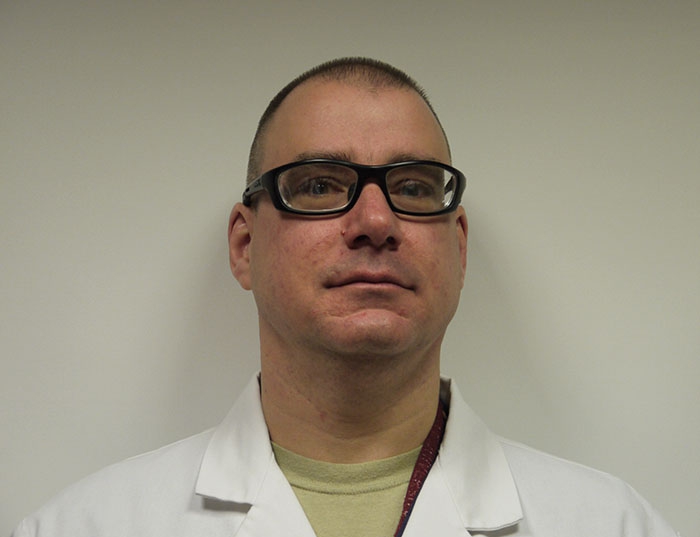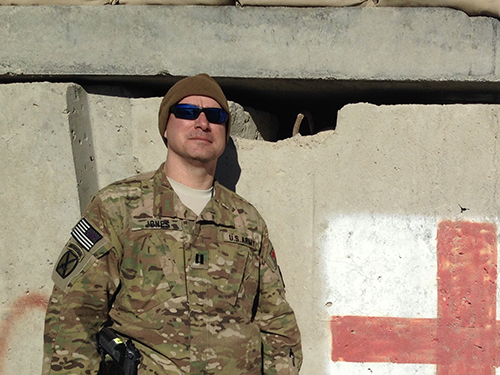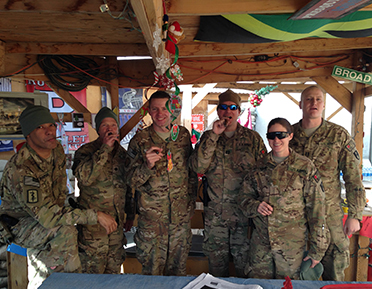 John W. Jones, MSN, CRNA, works at UPMC Presbyterian Hospital as a nurse anesthetist in the anesthesiology department. For National Veterans and Military Families Month, we asked John to share his experiences as a Veteran and professional in anesthesiology.
John W. Jones, MSN, CRNA, works at UPMC Presbyterian Hospital as a nurse anesthetist in the anesthesiology department. For National Veterans and Military Families Month, we asked John to share his experiences as a Veteran and professional in anesthesiology.
Please share some details about your military service and experience. In which branch of the armed forces did you serve? Where were you stationed?
I commissioned in 1999 in the United States Army Reserve as a “traditional reservist.” Since that time, I have been mobilized to active duty 11 times, have been stationed in Army posts all over the world, and have served in three tours to Afghanistan and Iraq for Operation(s) Enduring Freedom and Iraqi Freedom.
What motivated you to join the military, and how did your service shape your values and perspective on life?
Even as a child, I always had some type of "calling “to the service; both my grandfather and my father served. As I grew in age, however, that "calling" got placed on the back burner for other priorities such as college, my nursing career, and my family. Finally, when I decided to attend nurse anesthesia school, I enrolled in an Army program that paid me a stipend during school. Upon graduation, I would be obligated to serve four years of "traditional" reserve time. Twenty-four years later, I am still enjoying this service. Being an Army Reserve officer combined with my overseas deployment has definitely changed my perspective on life. I no longer take for granted the freedoms that we as Americans enjoy after witnessing the citizens of other nations fight and die to obtain some of those freedoms (oftentimes unsuccessfully).
 What have you enjoyed most about serving in the military? Can you share some of your most memorable experiences or moments from your time in the military, and how they have impacted your life?
What have you enjoyed most about serving in the military? Can you share some of your most memorable experiences or moments from your time in the military, and how they have impacted your life?
The best part of being in the military is the people with whom I have had the honor to serve. Truly, these people are family to me, and I would do anything for them, and them for me.
How has your military service as a Veteran influenced your approach to anesthesia practice? What skills or values from your military experience do you find most applicable in the field of anesthesiology?
The miliary emphasizes planning; in any situation you need to have a Plan A, Plan B, Plan C, etc. In other words, you need to try to plan for every contingency. This has become my approach in anesthesia as well. Especially with the very complex procedures performed at UPMC Presbyterian, I always try to think of different plans and interventions should the first one fail. Additionally, I try to communicate with all members of the surgical team. As a young Army officer, I was taught that communication with the members of the unit was crucial to success, and I have carried that over to my civilian practice.
In what ways do you think your military background has prepared you for the high-pressure environment often associated with surgical procedures and anesthesia administration? Can you provide an example from your experience where your military training helped you handle a challenging situation in the operating room?
Acting as a military officer engaged in overseas operations has helped me in the high-pressure environment of Presby’s OR, and excelling in Presby’s OR has helped me become a better Army officer. Both environments, although very different from one another, still function on the same principles of anesthesia administration. By being able to learn and grow from these different environments, I become more of an asset to both arenas.
Many Veterans possess strong leadership and teamwork skills. How have you applied your leadership abilities in your role as a CRNA, especially in the context of working within a medical team during surgeries? Can you share a specific instance where your leadership skills were instrumental in ensuring the well-being of a patient or the smooth operation of the operating room?
Using strong leadership and teamwork skills is crucial for optimal patient care. During any surgery or procedure, a final safety check or “time-out” checklist is completed to ensure all members of the surgical team are “on the same page.” At this time, any team member (including the anesthesia provider) has a duty to speak up if he/she feels that something is wrong or unclear regarding the surgery/procedure. It is leadership and teamwork such as this that keeps our anesthetized surgical patients safe.
 How do you think society can better support and appreciate the contributions of Veterans, especially during National Veterans and Military Families Month?
How do you think society can better support and appreciate the contributions of Veterans, especially during National Veterans and Military Families Month?
Society can support and donate to charities that directly affect and support causes specific to Veterans such as PTSD, Veteran homelessness, and Veteran employment.
Looking back on your military service, what are you most proud of, and is there anything you wish civilians better understood about the experiences of Veterans?
I am proud to have played a small role in getting wounded soldiers back home to their families. In addition, I am extremely proud to have served with every one of my brothers and sisters in the Army. They truly are American heroes.
